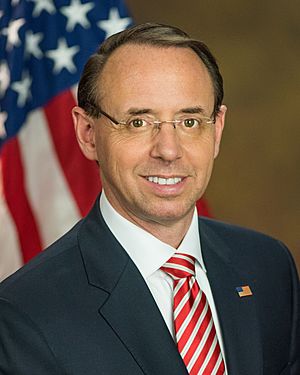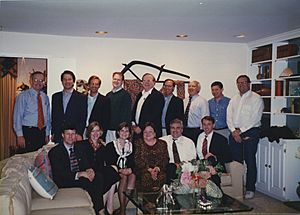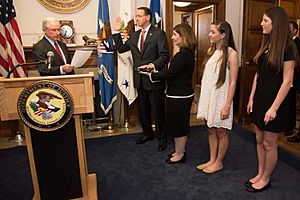Rod Rosenstein facts for kids
Quick facts for kids
Rod Rosenstein
|
|
|---|---|

Official portrait, 2019
|
|
| 37th United States Deputy Attorney General | |
| In office April 26, 2017 – May 11, 2019 |
|
| President | Donald Trump |
| Preceded by | Sally Yates |
| Succeeded by | Jeffrey A. Rosen |
| Acting United States Attorney General | |
| In office November 7, 2018 |
|
| President | Donald Trump |
| Deputy | Himself |
| Preceded by | Jeff Sessions |
| Succeeded by | Matthew Whitaker (acting) |
| United States Attorney for the District of Maryland | |
| In office July 12, 2005 – April 26, 2017 |
|
| President | George W. Bush Barack Obama Donald Trump |
| Preceded by | Thomas M. DiBiagio |
| Succeeded by | Robert K. Hur |
| Personal details | |
| Born |
Rod Jay Rosenstein
January 13, 1965 Philadelphia, Pennsylvania, U.S. |
| Political party | Republican |
| Spouse | Lisa Barsoomian |
| Children | 2 |
| Relatives | Nancy Messonnier (sister) |
| Education | University of Pennsylvania (BS) Harvard University (JD) |
| Signature | |
Rod Jay Rosenstein (born January 13, 1965) is an American lawyer who was the United States Deputy Attorney General from 2017 to 2019. This role made him the second-highest official in the United States Department of Justice.
Before that, he was a United States attorney for the District of Maryland. When he became deputy attorney general in 2017, he was the longest-serving U.S. attorney in the country.
President Donald Trump chose Rosenstein for the deputy attorney general job. Soon after, Rosenstein wrote a memo that President Trump used as a reason to fire FBI Director James Comey. This was a major event in American politics.
Because Attorney General Jeff Sessions had to step aside from the investigation into Russian interference in the 2016 election, Rosenstein took charge. He appointed Robert Mueller as a special counsel to lead the investigation. A special counsel is an independent lawyer who investigates possible crimes.
In 2018, Rosenstein was involved in the Trump administration family separation policy. This policy led to thousands of children being separated from their parents at the U.S.-Mexico border.
Rosenstein left his job as deputy attorney general in May 2019. He now works at a private law firm.
Contents
Early Life and School
Rod Rosenstein was born in 1965 in Philadelphia, Pennsylvania. His father, Robert, owned a small business, and his mother, Gerri, was a bookkeeper. He grew up in Lower Moreland Township. His sister, Nancy Messonnier, is a doctor who worked for the Centers for Disease Control and Prevention (CDC).
Rosenstein was an excellent student. He went to the Wharton School of the University of Pennsylvania and graduated in 1986 with highest honors in economics. After that, he went to Harvard Law School, one of the best law schools in the world. He graduated with honors in 1989.
Career as a Lawyer
First Jobs

After law school, Rosenstein worked as a law clerk for a judge. This means he helped the judge with legal research and writing. From 1990 to 1993, he worked for the United States Department of Justice as a lawyer who prosecuted, or tried to prove in court, cases of corruption by government officials.
During the presidency of Bill Clinton, Rosenstein worked for the United States Office of the Independent Counsel. He helped investigate President Clinton in a case known as the Whitewater controversy.
In 1997, he became an Assistant U.S. Attorney in Maryland. From 2001 to 2005, he worked for the Tax Division of the Department of Justice, where he helped manage lawyers who handled tax-related court cases.
U.S. Attorney for Maryland
In 2005, President George W. Bush appointed Rosenstein to be the United States Attorney for Maryland. A U.S. Attorney is the main federal prosecutor for their district. He was so well-respected that he kept his job through the entire presidency of Barack Obama.
As U.S. Attorney, Rosenstein's office handled major criminal cases. He was known for being tough on corruption and crime. For example, he prosecuted corrupt police officers and prison guards. His work helped lower the rates of serious crimes in Maryland.
In 2007, President Bush nominated Rosenstein to be a judge on the United States Court of Appeals for the Fourth Circuit. However, Maryland's two senators blocked the nomination, saying he did not have strong enough connections to the state.
Deputy Attorney General
Joining the Trump Administration
President Trump nominated Rosenstein to be the Deputy Attorney General in February 2017. The U.S. Senate confirmed him with a strong vote of 94–6.
A few weeks later, Rosenstein wrote a memo criticizing FBI Director James Comey's handling of an investigation into Hillary Clinton's emails. President Trump used this memo as the official reason for firing Comey. Rosenstein later told the Senate he knew Comey would be fired before he wrote the memo.
Appointing a Special Counsel
After Comey was fired, many people were concerned about the ongoing FBI investigation into whether the Trump campaign had worked with Russia during the 2016 election. The Attorney General, Jeff Sessions, had already removed himself from the investigation.
This meant Rosenstein was in charge. On May 17, 2017, he appointed Robert Mueller, a former FBI director, as a special counsel. This gave Mueller the power to investigate the matter independently. Rosenstein said this was in the public's best interest.
Controversies and Challenges
Rosenstein's time as deputy attorney general was filled with challenges. In 2018, some Republican members of Congress tried to impeach him. They claimed he was not sharing documents with them, but the effort failed.
In September 2018, The New York Times reported that Rosenstein had talked about secretly recording President Trump. The report also said he discussed using the 25th Amendment to remove the president from office. Rosenstein strongly denied these claims, and some said he had been joking.
Family Separation Policy
In 2018, Rosenstein supported the Trump administration's "zero tolerance" immigration policy. He told prosecutors to charge all adults who crossed the border illegally, even if they had children with them. This led to thousands of children, including babies, being separated from their parents. The policy was widely criticized. In 2021, a government report on the policy was released, and Rosenstein said the family separations "should never have been implemented."
End of the Mueller Investigation
In November 2018, President Trump appointed Matthew Whitaker as acting Attorney General, who then took over supervision of the Mueller investigation. When William Barr became the new Attorney General, he took final control.
The Mueller Report was finished in March 2019. Mueller did not decide whether President Trump had committed a crime of obstruction of justice. Attorney General Barr and Rosenstein then reviewed the report. They concluded there was not enough evidence to charge the president with a crime.
Rosenstein announced he would resign in April 2019, and his last day was May 11, 2019.
Life After Government
In January 2020, Rosenstein joined King & Spalding, a large international law firm. He now helps companies and individuals who are facing government investigations. He has also taught law classes at the University of Maryland and the University of Baltimore.
Personal Life
Rosenstein is married to Lisa Barsoomian, a lawyer. They have two daughters and live in Bethesda, Maryland. Rosenstein is a registered Republican.
From 2001 to 2011, he served on the board of directors of the United States Holocaust Memorial Museum.
See also
- George W. Bush judicial appointment controversies
- List of Jewish American jurists
- Russian interference in the 2016 United States elections


